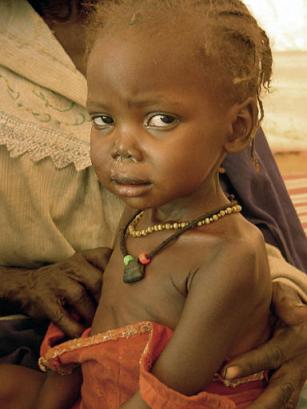A Darfur primer...
 Recently, I’ve been trying to educate myself about the crisis in Sudan. Like most people who pay attention to the news, I knew that there was a conflict going on in the Darfur region, but beyond that I wasn’t sure of much. Vaguely, I understood that Arab militias were committing atrocities against the non-Arab farmers of the region and several times I had heard the situation compared to the genocide in Rwanda. These few facts and impressions were pretty much all I had, though: it was sort of a thumbnail sketch of a horror in a far off corner of the world, a distant worry, one more bad thing jockeying for attention among all the other bad things in the world today.
Recently, I’ve been trying to educate myself about the crisis in Sudan. Like most people who pay attention to the news, I knew that there was a conflict going on in the Darfur region, but beyond that I wasn’t sure of much. Vaguely, I understood that Arab militias were committing atrocities against the non-Arab farmers of the region and several times I had heard the situation compared to the genocide in Rwanda. These few facts and impressions were pretty much all I had, though: it was sort of a thumbnail sketch of a horror in a far off corner of the world, a distant worry, one more bad thing jockeying for attention among all the other bad things in the world today.Now, after a few evenings worth of checking out information on the web, I have to admit that I’m only marginally better informed. From what I understand, the conflict began in early 2003 when two Darfur-based rebel groups, the Sudan Liberation Movement (SLM) and the Justice and Equality Movement (JEM), began to engage in skirmishes with the Sudanese government forces. The rebels believe that the Arab regime in Khartoum was oppressive in its dealings with the country’s non-Arab population, an opinion that seems to have been proved largely accurate by the government’s response: arming and encouraging Arab militiamen (named “janjaweed”) to terrorize Darfur’s non-Arab tribes. These bands, with the overt or tacit support of the authorities in Khartoum, are responsible for wholesale slaughter, mass rapes, and innumerable atrocities. Many thousands have died and many thousands more have been forced, starving and desperate, into refugee camps and over into neighboring Chad.
This strife, occurring in the country’s westernmost province, should not be confused with the conflict in Sudan’s southern region. That was a two-decade long civil war that has just recently gave way to a tentative, fragile ceasefire. Here, the Christians and animists fought for autonomy from the Muslim north, which had long enslaved, abused and persecuted them. After years and years of violence and butchery, Khartoum agreed to a cease-fire and an arrangement in which the country’s oil profits would be shared with rebel groups in the nation’s south. It is this episode that the situation in Darfur is often confused with.
The Darfur crisis is often described as a battle between Arabs and “black Africans”. This more accurately describes the Sudanese Civil War, although even there it isn’t an entirely correct characterization (both parties are equally African and both are, by appearance, black). Likewise, the violence in Darfur is often misunderstood as Muslim against non-Muslim. This was true of the Sudanese Civil War, but not of the Darfur situation. The Arabs and non-Arabs in Darfur are both Muslim. It is, in fact, the Arab janjaweed who have desecrated the Koran and torched mosques in their campaign of terror.
Essentially, the regime in Khartoum has exploited long-standing disputes between Darfur’s Arab and non-Arab populations. It has armed and encouraged the janjaweed in an attempt to destroy the rebel groups and their potential sympathizers without having to commit the Sudanese army, much of which is composed of soldiers from Darfur, soldiers with loyalties which may not correspond with Khartoum’s. This recalls Rwanda, where the Hutu leadership used the radical militias known as Interahamwe to massacre the Tutsis. In Sudan, the government can disavow its ties with the janjaweed and tell the world that they’re a just a bunch of thugs while the slaughter continues unabated and all-but-uncontrolled. No one believes them, of course, but no one will ever shame them into telling the truth, either.
So what can be done to put an end to the carnage and cruelty? That’s a tricky question, I’m afraid. My opinion is that people should give money and, if they can, time to human rights organizations who are actively working to help the civilians caught up in the violence. People should also work to make sure that Darfur and Sudan remains in the forefront of the nation’s consciousness. This is, of course, one of those areas that the “War on Terror” has only made more complex. The Bush Administration will occasionally come out with a moving soundbite or a feel-good resolution, but–contrary to some conservative fantasies–they’re probably not going to play hardball with the Sudanese government. We’re pumping them for information on our enemies in the Persian Gulf, and we don’t want them to clam up. Furthermore, as this article argues, any sort of Western-directed military effort stands a good chance of exacerbating the problem.
So what is to be done, besides donations and consciousness-raising? I have no idea. Like I said, I’ve just started studying all this. If you know more about it, if you’ve seen anything you think I should read, or if I’ve gotten something wrong here, please share that with me.

